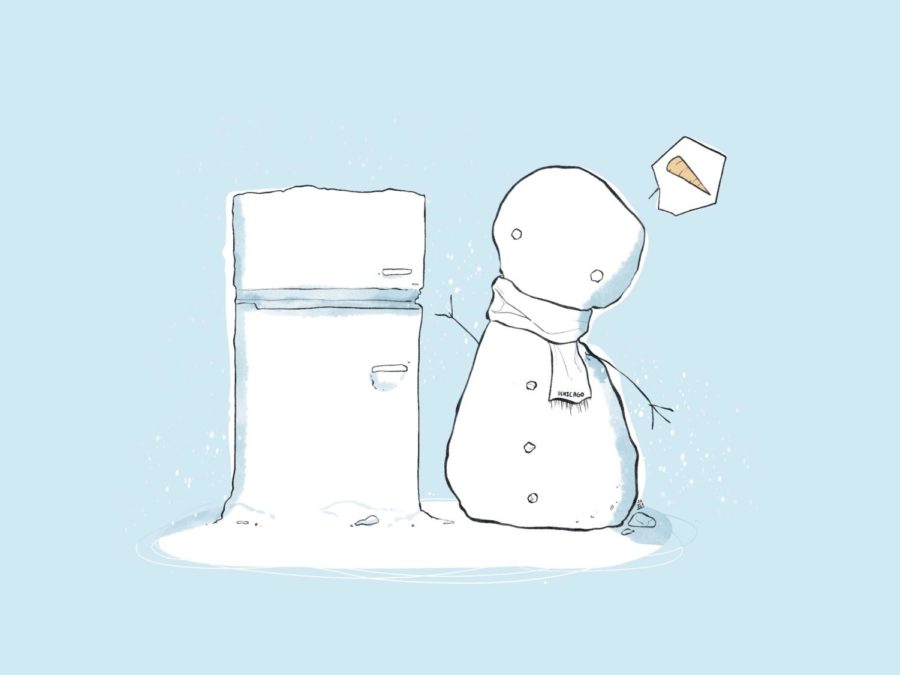When I tried to carry a bag of yogurt, milk, and salad kits into International House this morning, I was told that the community kitchen, along with the refrigerator and microwave oven in it, have been closed for about a whole year. Not for a week, not for two weeks, but indefinitely. Unable to find a place to store my perishable groceries, I buried the food in a pile of snow outside International House.
I tried to think about more sustainable ways to cope with the shutdown. Admittedly, I can enroll in an unlimited meal plan, but it means I need to go to the dining halls, all of which exceed a 15-minute walking distance from my residence, three times every day. This vision is not particularly exciting in this shiver-inducing winter, with its blasting wind, falling snow, and a temperature constantly dwelling below zero degrees Celsius. Meanwhile, an unlimited meal plan, which costs 2,284 dollars per quarter, is far more expensive than what it takes for me to buy the ingredients and cook on my own. Other options, such as ordering delivery food every day and dining in off-campus restaurants, are even more costly.
My friend has bought a personal refrigerator, a microwave oven, and an induction cooker in response to the kitchen shutdown. A small-to-medium-sized refrigerator is costly and takes up space in the already cramped dorm. Moreover, turning the dorm into a kitchen in addition to a bedroom not only causes hygiene concerns, such as making the foul smell of oil, smoke, and food debris linger in our sleep, but also poses potential fire hazards. Greasy food and aluminium silverware in the oven might catch fire if the microwave is not cleaned properly, and induction cookware, though without naked flame, can still cause ignition. Our dorms, unlike the community kitchen, are full of flammable objects, such as our quilts, mattresses, hair sprays, and hand sanitizers. Though fire hazards are also present in the community kitchen, obtaining microwaves and induction cookware in student dorms inevitably multiply the risks. Admittedly, some students had already acquired fridges and cooking equipment in their dorms before the kitchen shut down, but it’s likely that many more are purchasing them with the kitchen closed.
The front desk at International House told me that the shutdown was due to COVID-19. COVID-19 now seems to be the one-excuse-fits-all, but it is unclear how closing the community kitchen and driving the students to the dining halls can lower the infection rate. As long as the students are following COVID-19 housing guidance and the visitor, isolation housing, and face covering protocols are enforced, opening the community kitchen should not be risky. However, if some students choose to dine in off-campus restaurants as the community kitchens shut down, the risk of infection will be higher, and the move to shut down shared kitchens can be counterproductive.
Even if the residence halls’ decision to shut down community kitchens is due to legitimate concerns, they should make this decision after consulting with the students and presenting compensation for the students’ inconvenience. However, the residence halls have done neither. The students are not consulted but merely informed after the decision is made. The rent is not lowered either. UChicago’s housing is not cheap. A single room costs 11,256 dollars annually, which is roughly equivalent to a third of the real median personal income in the U.S. (35,805 dollars per year). I am not asking for a swimming pool or any luxurious equipment, nor am I asking for a personal bathroom or a personal kitchen. I am asking for a shared kitchen, or a shared refrigerator, in this entire building, but there isn’t any. Right now, I am paying the annual fee of 11,256 dollars to have my food buried in the snow.
The bargaining power between the University of Chicago and its students is always asymmetrical. The University didn’t lower its tuition in winter 2020 during the coronavirus pandemic despite the petition signed by 1,900 students. In this current case, the students’ bargaining power barely exists. Housing options near campus are limited, and among them, even fewer are both affordable and safe. First-year and second-year students have no alternatives since they are required to live on campus. Many students have no choice but to live on campus. However, the students’ lack of choices does not mean the residential halls can arbitrarily and unilaterally shut down their key facilities, such as community kitchens, without any form of compensation.
The coronavirus pandemic presents a hard time for everyone. Instead of alleviating the students’ hardships, the residential halls let the burdens disproportionately fall on the students by shutting down community kitchens. Moreover, such a move hardly has any perceivable benefit on curbing the spread of coronavirus and might even increase infection rate by driving more students to dine out. I can’t imagine if the residential halls had considered the students’ inconvenience to the slightest degree, they would still make this arbitrary decision.
I have been checking the weather reports and praying that it still snows so that the snow in which I put my food won’t melt. I hope when the sun comes out, the residential halls can reconsider their decision.
Yun Zhu is a third-year in the College.









